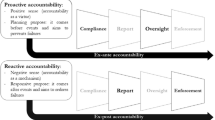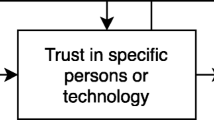Abstract
The paper presents a logical framework for the representation of interactions between institutional agents, human agents and software agents. A case study is used to analyze how obligations on institutional agents are “propagated” to human and software agents, and how actions performed by these agents count as actions that satisfy the obligations imposed to institutional agents. It is shown that the relationship between the different kinds of obligations and actions can be represented in terms of the concept of “count as” proposed by Searle, of role and of causality. The logical framework focus on those three concepts.


Similar content being viewed by others
Notes
See Chellas (1988) for the satisfiability conditions of normal modal operators and classical modal operators.
If in w′ other agents have performed some actions, it is assumed that in w′′ they have performed the same actions as in w′.
The meaning of the counterfactual condition is defined by Pörn as: “but for i 's action it would not be the case that ϕ”.
Pörn (1977) the worlds u′ related to the world u where we are are defined in that way: “we must consider all those hypothetical situations u′ in which the agent does as much as he does in u”, and that is the reason why the accessibility relation D is assumed to be reflexive by Pörn.
The operators Done and E are added to the language because “counts as” statements refer to actions that have been performed.
A more formal definition of the predicate Holds has been presented by Demolombe and Louis (2006).
This formula is “semi-formal” because it contains a universally quantified variable h which occurs both as an argument of the predicate Holds and as an index of the modal operator Done. To give a formal semantics to this kind of formula is out of the scope of this paper because it would require to go into too long technical details.
See also Sartor (2005) the distinction between the concepts of “counting as” and “emergence” proposed by Sartor.
We have slightly changed the notation to make easier the comparison with Jones and Sergot’s definition.
Balbiani et al. (2008) it has been formally proved that this inconsistency follows from the independence constraint about agents’ choices.
References
Aqvist L (2002) Old foundations for the logic of agency and action. Studia Logica 72
Balbiani P, Herzig A, Troquard N (2008) Alternative axiomatics and complexity of deliberative stit theories. J Philos Log 37(4):387–406
Carmo J, Pacheco O (2001) Deontic and action logics for organized collective agency, modeled through institutionalized agents and roles. Fundamenta Informaticae 48:129–163
Chellas BF (1988) Modal logic: an introduction. Cambridge University Press, Cambridge
Cuppens F (1994) Roles and deontic logic. In: Jones AJI, Sergot M (eds) Second international workshop on deontic logic in computer science, Oslo, Norway
Dastani M, Dignum V, Dignum F (2003) Role-assignment in open agent societies. In proceedings of the second international conference on Autonomous Agents and Multiagent Systems
de Lima T, Royakkers LMM, Dignum F (2009) Behaving responsible in multi-agent worlds. In Decker K et al. (ed) 8th international conference on Autonomous Agents and Multiagent Systems (AAMAS 2009)
Demolombe R, Jones AJ (2002) Actions and normative positions. A modal-logical approach. In: Jacquette D (eds) Companion to philosophical logic. Blackwell, New Jersey
Demolombe R, Louis V (2006) Norms, institutional power and roles: toward a logical framework. In: Esposito F, Ras ZW, Malerba D, Semeraro G (eds) Foundations of intelligent systems LNAI 4203. Springer, Berlin
Dignum V, Dignum F (2009) A logic for agent organizations. In Multi-Agent Systems: semantics and dynamics of organizational models, pp 220–241. IGI Publications, Hershey
Dignum V, Vazquez-Salceda J, Dignum F (2005) OMNI: introducing social structure, norms and ontologies into agent organizations. In: Bordini RH, Dastani M, Dix J (eds) Proceedings of the international workshop programming multi-agent systems (ProMAS 2004) LNAI 3346. Springer, Berlin
Esteva M, Rodríguez-Aguilar J, Lluis Arcos J, Sierra C, Noriega P, Rosell B (2008) Electronic institutions development environment. In Proceedings of the 7th international joint conference on Autonomous Agents and Multiagent Systems (AAMAS08)
Fornara N, Viganò F, Colombetti M (2005) Agent communication and institutional reality. In: van Eijk R, Huget M, Dignum F (eds) Developments in agent communication LNAI 3396. Springer, Berlin
Gelati J, Governatori G, Rotolo A, Sartor G (2002) Declarative power, representation, and mandate: a formal analysis. In: Bench-Capon T, Daskalopulu A, Winkels R (eds) Frontieres in artificial intelligence and applications, Number 89. IOS Press, Amsterdam
Governatori G, Dumas M, ter Hofstede AHM, Oaks P (2001) A formal approach to protocols and strategies for (legal) negotiation. In: Prakken H (eds) Proceedings of the 8th international conference on artificial intelligence and law. ACM Press, New York
Grossi D (2007) Desinging invisible hancuffs. Formal investigations in institutions and organizations for Multi-Agent Systems. PhD thesis, Utrecht University
Grossi D, Meyer J-J Ch, Dignum F (2008) The many faces of counts-as: a formal analysis of constitutive rules. J Appl Log 6:192–217
Hilpinen R (1997) On action and agency. In: Ejerhed E, Lindstrom S (eds) Logic, action and cognition: essays in philosophical logic. Kluwer, Alphen aan den Rijn
Horty JF, Belnap N (1995) The deliberative STIT: a study of action, omission, ability, and obligation. J Philos Log 24:583–644
Jones AJ, Sergot M (1996) A formal characterisation of institutionalised power. J Int Group Pure Appl Log 4(3):429–445
Kanger S (1983) New foundations of ethical theory. In: Hilpinen R (eds) Deontic logic. D. Reidel Publishing Company, Dordrecht, pp 36–58
Kuiper M, Meyer J-J Ch, Dignum FPM (1998) An investigation into deontics of durative actions. In: McNamara P, Prakken H (eds) Proceedings of deontic logic in computer science (DEON ’98)
Lopez y Lopez F, Luck M, d’Inverno M (2004) Normative agent reasoning in dynamic societies. In Proceedings of the third international conference on Autonomous Agents and Multi-Agent Systems. IEEE Computer Society
Lorini E, Longin D, Gaudou B, Herzig A (2009) The logic of acceptance: grounding institutions on agents attitudes. J Log Comput 19(6):901–940
Pacheco O, Santos F (2004) Delegation in a role-based organization. In: Lomuscio A, Nute D (eds) Deontic logic in computer science, LNCS 3065. Springer, Berlin
Pörn I (1977) Action theory and social science. Some formal models. Synt Libr 120
Santos F, Pacheco O (2003) Specifying and reasoning with institutional agents. In Proceedings of ICAIL
Sardis M, Vouros GA (2008) Electronic institutions infrastructure for e-chartering. In: Artikis A, O’Hare GMP, Stathis K, Vouros GA (eds) ESAW, LNCS 4995. Springer, Berlin
Sartor G (2005) Legal reasoning: a cognitive approach to the law. Springer, Berlin
Searle JR (1969) Speech acts: an essay in the philosophy of language. Cambridge University Press, New-York
Segerberg K (1989) Bringing it about. J Philos Log 18:327–347
Segerberg K (1992) Getting started: beginnings in the logic of action. Stud Logica 51:347–378
Segerberg K (2002) Outline of a logic of action. In: Wolter F, Wansing H, Rijke W, Zakharyaschev M (eds) Advances in modal logic, vol 3. World Scientific Publishing Co, Singapore
Segerberg K (2003) Some Meinong/Chisholm thesis. In: Segerberg K, Sliwinski K (eds) Logic, law, morality. A festrichft in honor of Lennart Aqvist, vol 51. Uppsala Philosophical Studies, Uppsala, pp 67–77
von Wright GH (1963) Norm and action. Routledge and Kegan, London
Author information
Authors and Affiliations
Corresponding author
Rights and permissions
About this article
Cite this article
Demolombe, R. Relationships between obligations and actions in the context of institutional agents, human agents or software agents. Artif Intell Law 19, 99 (2011). https://doi.org/10.1007/s10506-011-9110-7
Published:
DOI: https://doi.org/10.1007/s10506-011-9110-7




